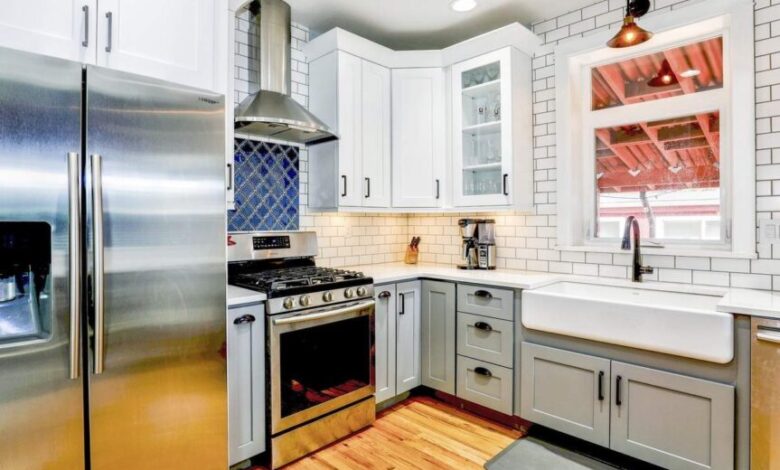Simple Steps to Extend the Life of Your Kitchen Appliances

Understanding the Importance of Regular Maintenance
Maintaining your kitchen appliances is essential for extending their lifespan. Much like cars that exhibit mechanical failures without regular service, ignoring appliance maintenance could lead to costly repairs or full replacements. Regular maintenance helps ensure that your kitchen gadgets function at their best, preparing meals efficiently and safely. When appliances run smoothly, they consume less energy and are less likely to break down unexpectedly. Moreover, following a structured maintenance routine can prevent minor issues from escalating into major problems.
For those needing replacement parts, resources such as SamsungParts provide a reliable solution. Whether you need a replacement for a refrigerator LED light or a microwave diode, accessing original parts can be key to maintaining appliance functionality and efficiency. Ensuring you have the exact parts designed for your specific model avoids compatibility issues and promotes smoother operations.
Cleaning: The First Line of Defense
Consistent cleaning of kitchen appliances is more critical than it might seem. With the constant use of cooking devices, crumbs, grease, and spills accumulate and can lead to inefficiency or damage. For ovens, microwaves, and stovetops, aim to remove food spills and splatters weekly, as this helps prevent damage to internal components and extends the life of these devices. A deep clean maintains the appliance’s aesthetic appearance, improves functionality, and prevents lingering smells.
Several guides detail how to clean each type of appliance for optimal results. Trusted sources like Consumer Reports provide comprehensive advice on maintaining appliance cleanliness tailored to their specific needs and usage. By incorporating simple, routine cleaning tasks into your schedule, you create a healthier kitchen environment.
Monitor and Replace Worn-Out Parts
Identifying and replacing worn-out components is crucial for the longevity of kitchen appliances. Small components, such as door seals, filters, or drip pans, can have a significant impact on the overall efficiency and effectiveness of appliances. For instance, broken seals can cause a refrigerator to lose its cool, leading to higher energy consumption and potential food spoilage. Similarly, clogged filters may restrict airflow in appliances, causing motors to work harder than necessary and risking burnout. By promptly addressing these small yet critical parts, you ensure optimal performance and energy efficiency.
Energy Efficiency: Saving Bills and Appliances
Energy-efficient practices benefit both your wallet and the environment while also extending the life of your appliances. One simple method is to always run dishwashers or washing machines with full loads, reducing both energy use and wear and tear on the appliance. Utilizing lower energy settings, when available, can also contribute to energy conservation and prolong the lifespan of devices. Similarly, understanding optimal temperature settings for refrigerators and freezers and avoiding overloading them ensures minimal energy strain.
To gain a deeper understanding of how these practices can impact your energy consumption, the U.S. Department of Energy offers comprehensive guides on improving household energy efficiency. By integrating a few simple changes into your routine, you can achieve meaningful savings and ensure prolonged appliance use.
The Impact of Proper Usage
Proper usage, aligned with manufacturers’ instructions, is fundamental in enhancing the lifespan of appliances. Misusing the device—such as overloading a washing machine or mishandling delicate components of a cooking range—can accelerate wear and lead to premature breakdowns. Being diligent in following recommended settings helps to avoid unnecessary stress on motors and other essential parts.
Implementing a practice of verifying the appliance’s manual for best usage practices can often prevent operational mistakes and help to understand the device’s full range of functionalities, ultimately extending its effective lifespan. Remember, how you use your appliances daily determines their longevity and performance.
The Role of Professional Check-Ups
While regular at-home maintenance is essential, professional inspections can provide deeper insights that go beyond routine checks. Professionals can spot potential issues before they become major problems, potentially saving you from expensive repair costs. Regular check-ups by certified technicians can help maintain operational efficiency and identify signs of wear that may not be obvious to the untrained eye. Periodic professional servicing ensures all elements of your appliances are functioning correctly and safely, providing peace of mind alongside prolonged utility.
The Importance of Storage
Correct appliance storage is crucial to protect from deterioration due to rust or moisture damage. Storing appliances in dry, well-ventilated areas helps to avoid conditions that may lead to rusting—a common problem that affects both aesthetics and functionality. Additionally, ensuring that cords and related parts are carefully managed and stored neatly prevents tangling and damage, which can lead to device failures. Proper storage practices contribute significantly to the overall health of your appliances.
Conclusion: Small Steps Make a Big Difference
Adopting these straightforward practices can contribute significantly to the lifespan of your home appliances. By diligently maintaining, utilizing, and storing gadgets correctly, you can save on energy bills and repair costs and enjoy enduring reliability and convenience in your kitchen. Remember, these small, cumulative efforts make a big difference in ensuring that your kitchen appliances continue to serve you efficiently over the years.



